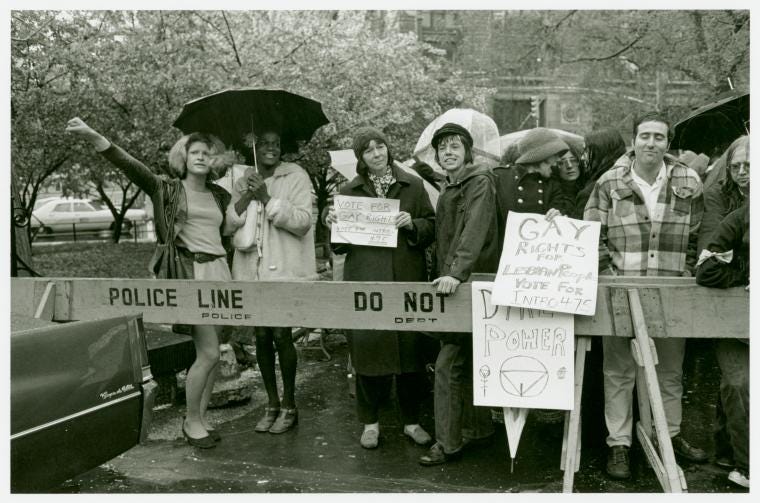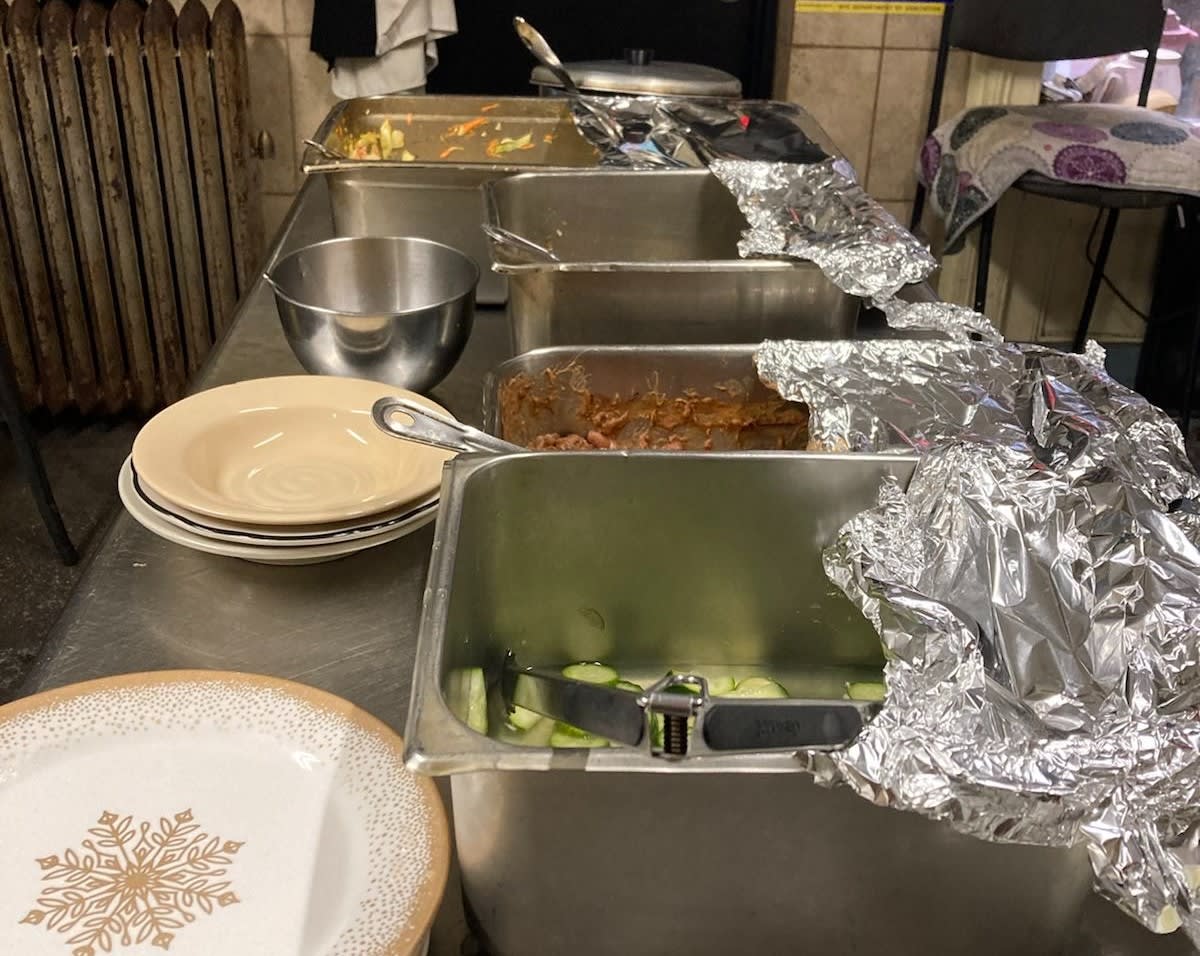By Ben Stegbauer
Over the past year I have noticed that this concept of family abolition has been growing in popularity. It caught my eye, because, well it has such a catchy and scandalous title. Basically it is the idea that we should critique and create alternatives to capitalism’s reliance and hyper-focus on the nuclear family. Having spent the last year living in a Catholic Worker community, I’ve been thinking a lot about how we can better organize our care and community. The family, while it has a great emotional and psychological importance on our life, is also a system of organizing our care of each other that we should think about. Family abolitionists first and foremost think that people deserve better care than our society provides us, especially for children, parents, the elderly, and people without families. So this article is just attempting to be an introduction to the idea, and a discussion of the places where maybe some family abolition could take hold.
The privatization of care
So when people talk about family abolition what exactly do they mean by “the family?” Historically they are talking about something incredibly specific. They are talking about the family formed out of the economic tradition of capitalism. Sophie Lewis in her book Abolish the Family: A Manifesto for Care and Liberation defines the family most succinctly in saying that the family “is, at root, the name we use for the fact that care is privatized in our society,” (4).
Sociologist Melinda Cooper in her article “All in the Family Debt” describes the poor law principle in England, and the way in which all the responsibility of individual welfare became increasingly relegated to the family throughout the 17th and 18th centuries in English society. These original laws were in response to an economic crisis caused by a famine, but they have become the foundation for how states around the world consider their responsibility to care for their citizens (or not).
Cooper notes that this privatization of care, shifting responsibility from the state to the family, would become clearly enacted in a recurring way: first emerging in a recognizable way in England in the 1600s, then in the economic uncertainty of the U.S. in the 1890s, and then again in the U.S. in the backlash to the New Deal welfare system in the 1960s and ‘70s.
Cooper and other family abolitionists also argue that the ideas pushing the privatization of care to the family were also central and foundational to the advent of the economic reforms of the early 1970s popularly called neoliberalism, a term referring to specific reforms favoring privatization of government programs, deregulation, and overall smaller government. Cooper is famous for arguing that neoliberalism was not founded on the principle of “individualism” that theorists of all disciplines often cite, but instead on the foundation of familial responsibility. This assertion can be seen blatantly by economists from the Chicago School, a wave of economic thinkers out of the University of Chicago led by Milton Friedman who helped push these neoliberal ideals into the mainstream, but also by the direct legislation of Ronald Reagan. While governor of California, Reagan gutted social programs in favor of family responsibility for care. Specifically, he gutted programs that helped provide healthcare for people and children with disabilities, or even geriatric care. “As policymakers imposed cuts to health, education, and welfare budgets, they simultaneously identified the family as a wholesale alternative to the twentieth century social state…responsibility for deficit spending shifted from the state to the household…” While gutting funding for single mothers, Reagan, in the spirit of the poor law principle, wrote and endorsed legislation that insisted that biological fathers be found and held responsible.
Reagan then of course tried to make these principles work on a federal level when he became president, having varying degrees of success. It was Democrat Bill Clinton who officially succeeded in enthroning these principles with the passage of his welfare reform of 1996. Clinton succeeded on a level and to a degree that Reagan was never able to. Clinton combined his neoliberal ideas with the demands of social conservatives to push this ideal of familial responsibility. Melinda Cooper describes this phenomenon astutely in saying:
“Neoliberals and social conservatives are equally invested in the promotion and enforcement of legal family obligations, albeit for different reasons: neoliberals because they oppose the state subsidization of irresponsible lifestyle choices (sex outside of marriage, illegitimate childbearing and unprotected sex, all of which represent a potential burden on the state), neoconservatives because they see the bonds of family life as foundational to social order itself.”
It is this historical context that describes exactly what the family has become in our modern context: It has become this carefully planned combination of neoliberal ideals and social conservatism built to relieve the state of any economic responsibility for its citizens. I find this social conservatism interesting, because there are even self-described leftists and anti-capitalists who I know who will say things like “it’s just so much simpler to do it the traditional way.” They are saying it is easier and simpler to live a life that follows traditional family values. And perhaps they are right, but this reality comes about because most of us don’t have any other options.
The violence of economic dependence
For family abolitionists this neoliberal family leaves a lot lacking, and I think it’s easy to see from the beginning that this family is unsatisfactory, but it is this family that we all function within, and that all of our families function within. It is this family that people become economically dependent upon, and people end up in harmful situations because of. Even thinking back to the Reaganite attack on single mothers, we can see just how many dangerous situations that would put women into, including the decision between reconnecting with an abusive ex-partner or receiving any funding to help provide for their child. This familial responsibility ideal clearly turns violent quick. It does not take long for us to think of the economic dependence children face and the ways in which that makes them especially vulnerable to violence and abuse.
Of course we all were taught about this familial responsibility. I grew up in an area of the country that worshiped Reagan and his policies, and I remember failing schools were blamed on parents not spending enough time with their children studying, bad parental diets are blamed for adverse health in children, and the most petty one I remember is that smokers were thought to be the victim of their parents not telling them it was actually unhealthy. This notion of familial responsibility was and still is incredibly insidious, and destructive. The notions of familial responsibility used to blame entire communities that are both failed and actively destroyed by the state is a system of this racialized and gendered capitalism. This is where that social conservatism comes back in.
While the main point of Melinda Cooper’s work is about the recurrence of privatization of care in the family, there are other points to make against the creation of the capitalistic nuclear family: this is the reality of economic dependence and patriarchal violence. Children are legally and economically dependent on their families, on their parents for care. And it opens children up to a radical amount of abuse, especially queer children, as well disabled dependents and elderly people that need any form of care, too. It is not just an unfortunate story that happens, but it is the norm. Domestic violence of all forms is not just common, but instrumental in the enforcement of patriarchy, and the enforcement of this neoliberal refusal to take care of people. It is this economic dependence that is itself violent.
But this privatization of care is also unfair to parents too. Why should all reproductive labor for a human being be rest upon one or two people, occasionally with the help of a grandparent or other relatives? In this sense, family abolition makes the dual claim that it is not only children that deserve better, but also parents. The common story I seem to hear is that parents must find a job that pays them well enough to be able to pay for their student loans and the price of childcare. Of course, a job with longer hours, perhaps even business trips that ultimately means less time with their children, let alone making enough cash to pay off any medical debt/the price to get through childbirth safely. Sophie Lewis’ book, Abolish the Family: A Manifesto for Care and Liberation, is good about just convincing you that everyone involved “deserves better.” Lewis and Lola Olufemi started out a podcast talking about this reality that to love your family would mean wanting better for them, which would mean wanting to change how we’re structuring these organizations of privatized care – or in their words, to abolish the family.
Writer M.E. O’brien states this clearly in a paragraph in her book Family Abolition: Capitalism and the Communizing of Care:
“Family life has been radically transformed. The normative family ideal no longer bears much resemblance to anyone's actual lives. In many ways, this has been a huge improvement in human freedom. But these shifts also entail an intensification of another form of unfreedom. The decline of the male-breadwinner working-class family form has shifted the experience of women and queers from dependency on the personal domination of a husband or father to dependency on the impersonal domination of the wage. Just as the male-breadwinner family was enabled by a succession of victories of the workers' movement, prolonged economic crisis and the collapse of the workers' movement has condemned people to material deprivation, market dependency, and alienated work. The new heterogeneous family structures are a symptom of desperation as much as they are of the practice of care, and in this market dependency everyone is subject to new forms of predation. A queer youth freed from a violent relationship with their parents may be subject to the new risks of street-based sex work; young mothers opting not to marry their abusive boyfriends may find themselves working long hours in retail service under managers who sexually harass them. Everyone is forced to find and secure work, competing constantly with other proletarians, and subject to the gender and sexual discipline of employers and the work process. Freedom from the normative patriarchal family may be an improvement for many, but it has not made a free society” (page 153).
But it is this point above that highlights the reality of what is going in with the family more acutely than any other. The family in its fullness is a way of organizing our lives. More specifically it is a way of organizing in order to provide care for people. But this also means that it can change and we can imagine new ways of organizing care.
Alternative ways to organize our lives
Sophie Lewis describes some of the other ways people have tried to imagine different organizations of care. Family abolition has long been discussed and enmeshed within the larger political goals of anarchist and communist circles. Marx and Engels famously discussed family abolition in The Communist Manifesto (as well as The German Ideology, among others) where home education and home care would be socialized. It would be inaccurate to say though that those two authors originated the idea. Pre-colonial systems of care among the Indigenous peoples of North America and Africa did not rely on the family, and instead had care relations based on kinship ties and collective child rearing. Lewis actually traces the history of how “the family” was actually forced upon Indigenous peoples as a way of forcing capitalism and capitalist economic relations upon these colonized communities. Lewis then traces the history of family abolition from Soviet feminist Alexandra Kollontai to New York’s Lower East Side Jewish radical Shulamith Firestone to the Gay Liberation movement to the Wages for Housework movement, and finally to the modern interracial trans leaders in the twenty-first century family abolition movements.
So I guess the question then becomes how do we do this? How do we begin to abolish the family? Lewis in her book quotes M.E. O’Brien: “‘the best starting point to abolish the family,’ is the protest kitchen: ‘Form self-organized, shared sleeping areas for safety. Set up cooperative childcare to support the full involvement of parents’…Expand from there, and never stop expanding,” (78). So perhaps that is what we should do. Ever since the George Floyd Uprisings of 2020 more and more mutual aid networks have popped up around the country. We should enthusiastically join them. These groups often live and die by the slogans: “we take care of us,” and “care not cops.” This is a good start. And it relies upon this idea of community. I think perhaps that is what family abolition brings you to. It brings you to the idea that finding ways to live outside of the capitalistic familial methods of care is in itself counter-cultural. But it is also hard, of course, and isn’t always able to function outside of the dynamics of the family discussed above.
I lived in a Catholic Worker community for a bit over a year. And in many ways these communities function as the protest kitchen that O’Brien is pointing to. We cooked for everyone that came to the door and was in need. Showers and hygiene supplies were offered as time allowed. Childrens’ clothes were given to migrant families and many other small acts of mutual aid. And on the rare occasion more permanent housing was given. At the same time though, the Worker I lived at also recreates many of the oppressive power dynamics that all the above authors are afraid of. It functions less as a place of family abolition and more so as a place of family expansion. It moves the family away from something defined as blood relation and more so as a random group of people dedicated to each other. Again, in many ways this is wonderful. It feels like the queer “chosen family” houses that are often pointed to as ways forward, and countries like Cuba should be lauded for their inclusion of these types of relationships in legal code. But organizations like the Worker and even other mutual aid groups leave a lot to be desired at the same time.
Living at the Worker it was evident the ways in which this random community of people actually just recreated and replicated many of the disastrous realities of the family. Mostly through the reality of economic dependence, and more specifically seen through the reality of housing dependence. The Worker, in its Catholicism, also recreates some of the social conservatism seen above, and perhaps this is another main source of this violence. I say this to say that sometimes when these dependent relationships are formed it seems inherent that uneven power dynamics will form and abuse and manipulation will take place. This is seen in the Worker especially when housing is offered. People that hold power, formal or informal within the community end up taking on seemingly parental roles and parental modes of influence over other people, especially vulnerable people. In this way I often questioned over that year and some whether these places of non-familial care were simply another form of privatized care that were ultimately unsatisfactory.
This is something to struggle with in the end though, because of course providing housing when the state refuses is a good thing to do. But are these groups and organizations of care functioning more so as family replacements rather than family expansions or family abolition? In reading and thinking through all of this, Cooper and Lewis’ very clear distinction that the family is another name for privatized care was poignant to me and helped me in reflecting on my experiences. Is it this “privatized care” that becomes the main point of violence? In the end I simply find family abolition and the study of the family useful here, because it affects the way that we create these communities and these organizations of care. These communities of care are often a refuge for those of us on “the Left.” They create small glimpses of the world and the relationships we want to see in the future. So I find it important to reflect and interrogate the ways in which we can remove all violent structures within them. Perhaps that means abolishing the unintended “families” that even these groups create.









Brilliant, thank you Ben. "The decline of the male-breadwinner working-class family form has shifted the experience of women and queers from dependency on the personal domination of a husband or father to dependency on the impersonal domination of the wage." This quote says so much. I think there's also much to be said for the reality that the practical application of the family system is disintegrating because monogamous coupling and childrearing are not happening in the ways they did 100 years ago. A lot of folks are not partnering or bearing children as either a conscious choice or because their lives are just working out that way, for a myriad of reasons. So what is their alternative: nursing homes as elders where they will be subject to neglect and abuse? A new way must definitely be envisioned and put into practical application. Thanks so much for naming it and for your thoughtfulness in beginning the conversation.
What a thorough, measured examination of family abolition – guess I've gotta write a different essay now since this one is already written!